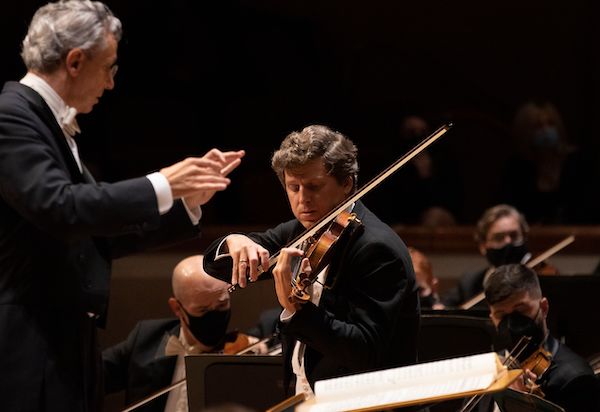Ehnes delivers ripely romantic Elgar with Luisi, DSO

New Covid-19 protocols in the face of surging cases did not deter patrons of the Dallas Symphony Orchestra from attending Thursday night’s concert at the Meyerson Symphony Center. Proof of vaccination or a recent negative test augment continued distanced seating, which saw all levels of the concert hall speckled with concert-goers.
This weekend’s program, led by music director Fabio Luisi, features the work of Elgar, Hailstork, and Schumann. With guest soloist James Ehnes, Thursday night’s performance opened the weekend with a program of consistently beautiful playing and inspired music-making.
The program began with Edward Elgar’s Violin Concerto in B minor. Opening in Brahmsian fashion with a long orchestral exposition, Luisi and the DSO offered a solemn and robust statement of the concerto’s thematic material. Following an enthusiastic beginning, second violins and violas presented a thoughtful expression of the descending, pathos-filled second theme.
Ehnes, poised and self-possesses, entered with a clear, warm violin tone. His technical address of the literature was undeniable—athletic and agile, with an emotional range that was equally delicate as it was virtuosic.
The reverent Andante was given ample care and attention, with ensemble and soloist exercising astute cohesion and even temperament throughout. Ehnes’ prowess and musicality were nowhere more evident, however, than in the fiery finale and accompanying cadenza. Muscular double, triple, and quadruple stops were contrasted by achingly tender trills and poignant legato, with an orchestral accompaniment that matched him in drama. The plush pizzicato moments were delivered smartly under Ehnes’ melodic solo line before leading to an exuberant coda.
In recognition of the upcoming Martin Luther King, Jr. Day, the second half of the program opened with Adolphus Hailstork’s Epitaph for a Man Who Dreamed—a seven-minute commemoration that honors King’s legacy and mourns, not only his death, but the lack of African-American homages within the Western classical music canon.
Contemplative and somber, the piece opened with hushed, pensive strings that swelled into a spiritual melody. Luisi’s dynamic control, with muted brass, stately winds, and warm harp arpeggios, showed respect for the score, before distant chimes beckoned a brief moment of silence. From thin air, the piece was concluded with an august orchestral tutti.
Ending the program was Robert Schumann’s Symphony No. 1. Titled “Spring,” the piece was written in short order—within the first two months of 1841—with inspiration gleaned from the two concluding lines of a Adoph Böttger poem: “O turn, o turn aside thy course, For the valley blooms with spring.”
Luisi extracted expert clarity from the ensemble in terms of textural balance and color. The slow introduction of the first movement opened with lovely string tremolos and a subtle fanfare motif in horns and trumpets. Rushed tempos made the return of the opening theme a bit muddy as the movement rushed to a close.
The Larghetto, however, saw the orchestra deliver artful navigation of Luisi’s tempo and dynamic shifts, with melodic richness in solo horn, oboe, and trombones. This orchestral cohesion continued through to the fourth movement—majestic and flourishing—with a delicate touch that harkens Schumann’s farewell to spring.
The program will be repeated 7:30 p.m. Friday. dallassymphony.org